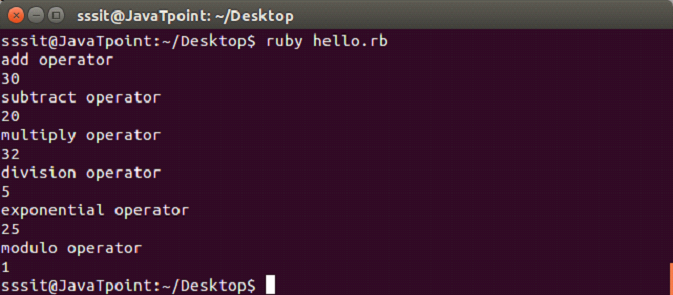Ruby OperatorsRuby has a built-in modern set of operators. Operators are a symbol which is used to perform different operations. For example, +, -, /, *, etc. Types of operators:
Unary OperatorUnary operators expect a single operand to run on.
Example In file hello.rb, write the following code. Output:  Airthmetic OperatorAirthmetic operators take numerical values as operands and return them in a single value.
Example In file hello.rb, write the following code. Output:  Bitwise OperatorBitwise operators work on bits operands.
Logical OperatorLogical operators work on bits operands.
Ternary OperatorTernary operators first check whether given conditions are true or false, then execute the condition.
Example In file hello.rb, write the following code. Output:  Assignment OperatorAssignment operator assign a value to the operands.
Comparison OperatorComparison operators compare two operands.
Example In file hello.rb, write the following code. Output:  Range OperatorRange operators create a range of successive values consisting of a start, end and range of values in between. The (..) creates a range including the last term and (...) creates a range excluding the last term. For example, for the range of 1..5, output will range from 1 to 5. and for the range of 1...5, output will range from 1 to 4.
Next TopicRuby variables
|
 For Videos Join Our Youtube Channel: Join Now
For Videos Join Our Youtube Channel: Join Now
Feedback
- Send your Feedback to [email protected]
Help Others, Please Share










